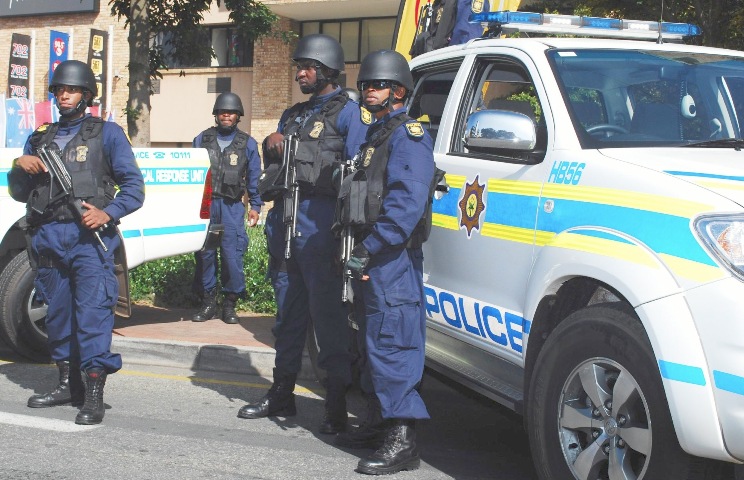Mayor Lobishe Welcomes Major Police Boost as Nelson Mandela Bay Battles Rising Crime
The deployment was spearheaded by Eastern Cape MEC for Community Safety, Xolile Nqatha, in partnership with national government authorities.

- Country:
- South Africa
Nelson Mandela Bay Municipality Mayor, Babalwa Lobishe, has praised the rapid deployment of additional police personnel to the metro, describing the move as a “timely and critical intervention” in the fight against rising crime levels. This follows the arrival of 150 Public Order Police officers—including 15 seasoned detectives and specialized crime intelligence units—who touched down in the city on Sunday to support overstretched local law enforcement teams.
The bolstered law enforcement presence comes in response to mounting concerns about crime in the metro, which has recently been highlighted as a hotspot in the Eastern Cape’s latest crime statistics report. The deployment was spearheaded by Eastern Cape MEC for Community Safety, Xolile Nqatha, in partnership with national government authorities.
In a statement released on Monday, Lobishe expressed her gratitude for the swift and strategic action, underscoring the importance of collaboration between local, provincial, and national structures.
“The deployment of these additional resources will enhance policing visibility, improve intelligence-led operations, and bolster investigations to ensure that criminals are swiftly brought to justice. Public safety remains a top priority, and we are confident that this initiative will contribute significantly to restoring law and order in our city,” said Lobishe.
The 150 police officers will be stationed in high-crime areas across the metro, with key focus zones identified as KwaZakhele, New Brighton, Helenvale, Gelvandale, Central, North End, Motherwell, Uitenhage, and Despatch. These areas have seen a sustained rise in violent crimes, gangsterism, and extortion, creating an urgent need for intervention.
Mayor Lobishe further acknowledged the concerns of residents living in fear, particularly in communities plagued by gang violence and organised crime.
“Our communities, particularly in hotspots like Helenvale and KwaZakhele, have been under siege from gangs and extortion syndicates. This cannot be allowed to continue. We commend MEC Nqatha and national government for hearing our plea and acting decisively.”
The latest statistics released on 12 March 2025 by MEC Nqatha revealed a troubling picture for Nelson Mandela Bay. Although the metro experienced a 7.1% decrease in serious crime during the second quarter of the 2024/2025 financial year, it still accounted for 23.4% of all serious crime in the Eastern Cape.
Alarmingly, some violent crimes saw significant increases. Attempted murder rose by 9.0%, while assault with intent to cause grievous bodily harm went up by 3.5%. Trio crimes—which include carjacking, house robbery, and business robbery—also climbed by 2.4%. House robberies alone spiked dramatically by 14.9%, raising concerns about home security and the safety of families.
Despite these worrying trends, the city saw a decline in certain categories. Aggravated robbery fell by 3.4%, common robbery dropped by 2.4%, and sexual offences decreased by 6.4%. Business robberies also saw a notable 9.1% reduction, indicating that some law enforcement strategies are yielding results.
Further data from the third quarter of the 2024/2025 financial year offered a mixed picture. Nelson Mandela Bay contributed to a 13.5% reduction in serious crime cases province-wide, yet it still made up 22.5% of the Eastern Cape’s total serious crime reports. Lobishe said this duality highlights the ongoing challenges law enforcement faces, especially in persistently problematic areas.
“The most problematic police stations for serious crimes and rape cases remain unchanged since the last quarter. These patterns suggest a need for targeted policing strategies and stronger community partnerships to address the root causes of crime in these hotspots,” she noted.
Lobishe reiterated that the battle against crime would not be won by law enforcement alone. She called on residents, community organizations, and civil society to work hand-in-hand with authorities to root out criminal elements and create safer neighborhoods.
“We must build a culture of cooperation and trust between police and the public. Reporting crime, providing information, and supporting community policing efforts are all vital in turning the tide.”
She also pointed to the need for broader social interventions, including youth empowerment programs, job creation, education, and drug rehabilitation initiatives to address the socio-economic drivers of crime.
With the arrival of national police reinforcements, Lobishe expressed optimism that residents of Nelson Mandela Bay will begin to feel a stronger sense of safety and security. The newly deployed teams will not only enhance law enforcement capacity but also serve as a visible deterrent to criminal activity in the metro.
“This is not just about arresting criminals. It’s about reclaiming our communities. It’s about sending a strong message that lawlessness will not be tolerated in Nelson Mandela Bay,” she concluded.
As the city braces for further law enforcement operations, eyes are now on the effectiveness of this tactical deployment in reducing violent crime and restoring public confidence in policing.
- READ MORE ON:
- Babalwa Lobishe
- Nelson Mandela Bay










